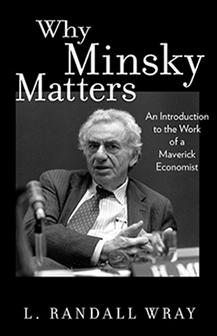
Research Topics
Publications on Money and banking
-
The Swedish Monetary System from a Balance Sheet Perspective
Working Paper No. 1035 | January 2024In this paper, we discuss the balance sheet mechanics of the Swedish government. We examine spending, government bond purchases, and tax payments. As long as the Swedish central bank, which is created through Swedish laws, supports the Swedish central government, it cannot run out of money. The Swedish government therefore plays a large role in the Swedish economy. It can and should target full employment and price stability, bringing to bear its fiscal power.Download:Associated Program:Author(s):Dirk Ehnts Jussi Ora -
CBDC Next-Level: A New Architecture for Financial “Super-Stability”
Working Paper No. 1015 | February 2023Fractional reserve regimes generate fragile banking, and full reserve regimes (e.g., narrow banking) remove fragility at the cost of suppressing the role of banks as lenders. A Central Bank Digital Currency (CBDC) could provide safe money, but at the cost of potentially disrupting bank lending. Our aim is to avoid this potential disruption. Building on the recent literature on CBDCs, in this study we propose what we call the “CBDC next-level model,” whereby the central bank creates money by lending to banks, and banks on-lend the proceeds to the economy. The proposed model would allow for deposits to be taken off the balance sheet of banks and into the balance sheet of the central bank, thereby removing significant risk from the banking system without adversely impacting banks’ basic business. Once CBDC is injected in the system, irrespective of however it is used, wherever it accumulates, and whoever holds and uses it, it will always represent central bank equity, and no losses or defaults by individual banks or borrowers can ever dent it or weaken the central bank’s capital position or hurt depositors. Yet, individual borrowers and banks would still be required to honor their debt in full, lest they would be bound to exit the market or even be forced into bankruptcy. The CBDC next-level model solution would eliminate the threat of bank runs and system collapse and induce a degree of financial stability (“super-stability”) that would be unparalleled by any existing banking system.Download:Associated Program:Author(s):Biagio Bossone Michael Haines -
Why Minsky Matters: An Introduction to the Work of a Maverick Economist
Book Series, November 2015 | November 2015By L. Randall Wray

Perhaps no economist was more vindicated by the global financial crisis than Hyman P. Minsky (1919–1996). Although a handful of economists raised alarms as early as 2000, Minsky’s warnings began a half century earlier, with writings that set out a compelling theory of financial instability. Yet even today he remains largely outside mainstream economics; few people have a good grasp of his writings, and fewer still understand their full importance. Why Minsky Matters makes the maverick economist’s critically valuable insights accessible to general readers for the first time. Author L. Randall Wray shows that by understanding Minsky we will not only see the next crisis coming but we might be able to act quickly enough to prevent it.
As Wray explains, Minsky’s most important idea is that “stability is destabilizing”: to the degree that the economy achieves what looks to be robust and stable growth, it is setting up the conditions in which a crash becomes ever more likely. Before the financial crisis, mainstream economists pointed to much evidence that the economy was more stable, but their predictions were completely wrong because they disregarded Minsky’s insight. Wray also introduces Minsky’s significant work on money and banking, poverty and unemployment, and the evolution of capitalism, as well as his proposals for reforming the financial system and promoting economic stability.
A much-needed introduction to an economist whose ideas are more relevant than ever, Why Minsky Matters is essential reading for anyone who wants to understand why economic crises are becoming more frequent and severe—and what we can do about it.
Published by: Princeton
